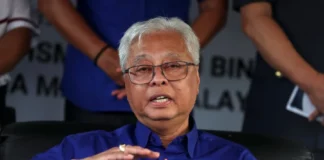KUALA LUMPUR, Nov 7 – With an allocation of RM322.5 billion, the highest in the country’s history, the 2021 Budget is seen as an allocation which will be a ‘shield’ in facing the various challenges of the COVID-19 pandemic.
The budget, which is the singular gamble of the National Alliance government (PN) with the theme “Stand United, We shall Prevail”, could increase the liquidity of the people and balance the economic needs of the people and the country.
If the previous allocations were more focused on aspects of development and efforts to improve the country’s economy, it was different this year, when the government placed priority on protecting, restoring and ensuring the well-being of the people affected by the COVID-19 pandemic.
Much presented by Finance Minister Tengku Datuk Seri Zafrul Tengku Abdul Aziz revolved around the recovery process from the epidemic.
This budget this time was also seen as quite special because it brought full humanitarian values in facing a truly challenging situation, among others by appreciating the front line staff of the Ministry of Health (MOH) by providing a “one off” incentive of RM500 for their sacrifices in helping to deal with the pandemic that had hit the country since January.
In addition, the government’s concern could be seen when they heard the grievances of the people, especially those who had lost their jobs due to the epidemic that hit almost every country in the world.
The unemployment rate of 4.7 per cent in August was seen as still high although almost all sectors of the economy had been mobilised during the period of the Restoration Movement Control Order (RMCO).
This is coupled with the increasing spread of the COVID-19 epidemic that had become more serious lately, which would continue to question the ability of the labour market in absorbing excess workers due to unemployment.
For Universiti Kebangsaan Malaysia (UKM), Faculty Of Economics and Management senior lecturer (UKM) Dr Wye Chung Khain, the 2021 Budget presented yesterday showed the government’s serious efforts in reducing the unemployment rate through more efficient job matching, reducing the cost of hiring and improving technical skills in facing the Fourth Industrial Revolution (Industry 4.0).
He said the formation of the National Employment Council to be chaired by Prime Minister Tan Sri Muhyiddin Yassin was expected to create new employment opportunities and offers training in line with the needs of the labour market to facilitate matching between employers and job applicants.
He said the extension period of the wage subsidy programme for another three months which was more targeted at affected employees in the tourism and retail sectors was expected to ease the burden of wage payment among employers.
“Increasing the employee limit for each wage subsidy application is also expected to reduce the tendency of employers to lay off workers due to cost constraints following the fall in demand from consumers due to the COVID-19 outbreak,” he told Bernama when commenting on the 2021 Budget presentation.
Wye said the extension of the three-month job search allowance period under the Employment Insurance Scheme was also expected to alleviate the cost of living of the unemployed who had lost their jobs due to the contagious COVID-19 outbreak.
Financial incentives given to local graduates in taking professional certificate courses at public and private universities were expected to improve their technical skills so that their roles were not easily replaced by artificial intelligence and automation processes in the Industry 4.0 era, he said.
Universiti Putra Malaysia (UPM) School of Business and Economics senior lecturer associate professor Dr Abdul Rahim Abdul Samad said Malaysia, which was currently in the recovery phase, was able to achieve economic recovery objectives through the 2021 Budget which was a continuation of the Prihatin Rakyat Economic Stimulus Package (PRIHATIN), Additional PRIHATIN SME, National Economic Regeneration Plan (PENJANA) and Kita Prihatin.
“The entire stimulus package announced earlier is worth RM305 billion or 20.7 per cent of the Gross Domestic Product (GDP).
‘’It is a huge amount allocated by the government for this recovery process and with the budget of RM322.5 billion presented yesterday is seen as very comprehensive, “he said.
He added that this recovery process supported three main goals, namely, the well-being of the people, business continuity and economic resilience.
For the well-being of the people, Abdul Rahim said various assistance was given to the B40 group such as the calm protection voucher programmer (Baucar Perlindungan Tenang), borrowers from that group were also given the option of postponement of installments, job opportunities for the target group, Prihatin Rakyat Aid (BPR), Prihatin Networking programme (aid to get internet) and many more including the scope of tax relief.
The revelation of the Minister of Finance on the success of some individuals in starting their businesses by using the National PRIHATIN Aid fund and creating employment opportunities for the locals, showed that the government was very concerned about the well-being of the people and listened to the people’s grievances.
This was translated into the announcement that pleased the people when the government gave permission for the withdrawal of the Employees Provident Fund (EPF) Account 1 of RM500 for 12 months.
He explained that the people from the SMEs business group and micro entrepreneurs were also not forgotten to ensure the continuity of their businesses with the help of the Bumiputera Micro SMEs of RM510 million and the assistance of the Development Bank and SME Bank of RM800 million.
“Overall, economic resilience will be achieved through various allocations channeled by the government through the 2021 budget.
‘’I can conclude here, this 2021 budget is a budget that prioritises the well-being of the people and all parties must unite in facing the challenges of the people, business and economic performance due to COVID-19, “he said.
Meanwhile, UKM, Faculty of Economics and Management, Professor of Economics Prof Dr Jamal Othman described the 2021 Budget as balanced and fair, with the theme outlined reflecting the well-being of the people and the continuity of business which was believed to please all walks of life.
He said, the aspect of economic sustainability, especially those related to the goal of sustainable development, issuance of sukuk/bond for environmental programmes as well as community-based economic empowerment through the endowment approach was an attraction in this budget.
“I think this aspect will be seen by investors as something conducive because it is characterised by a resilient economy and pays high attention to sustainable well-being,” he said, who is also the National Professors Academy, Economic and Social Well-being Cluster head.
— BERNAMA
















